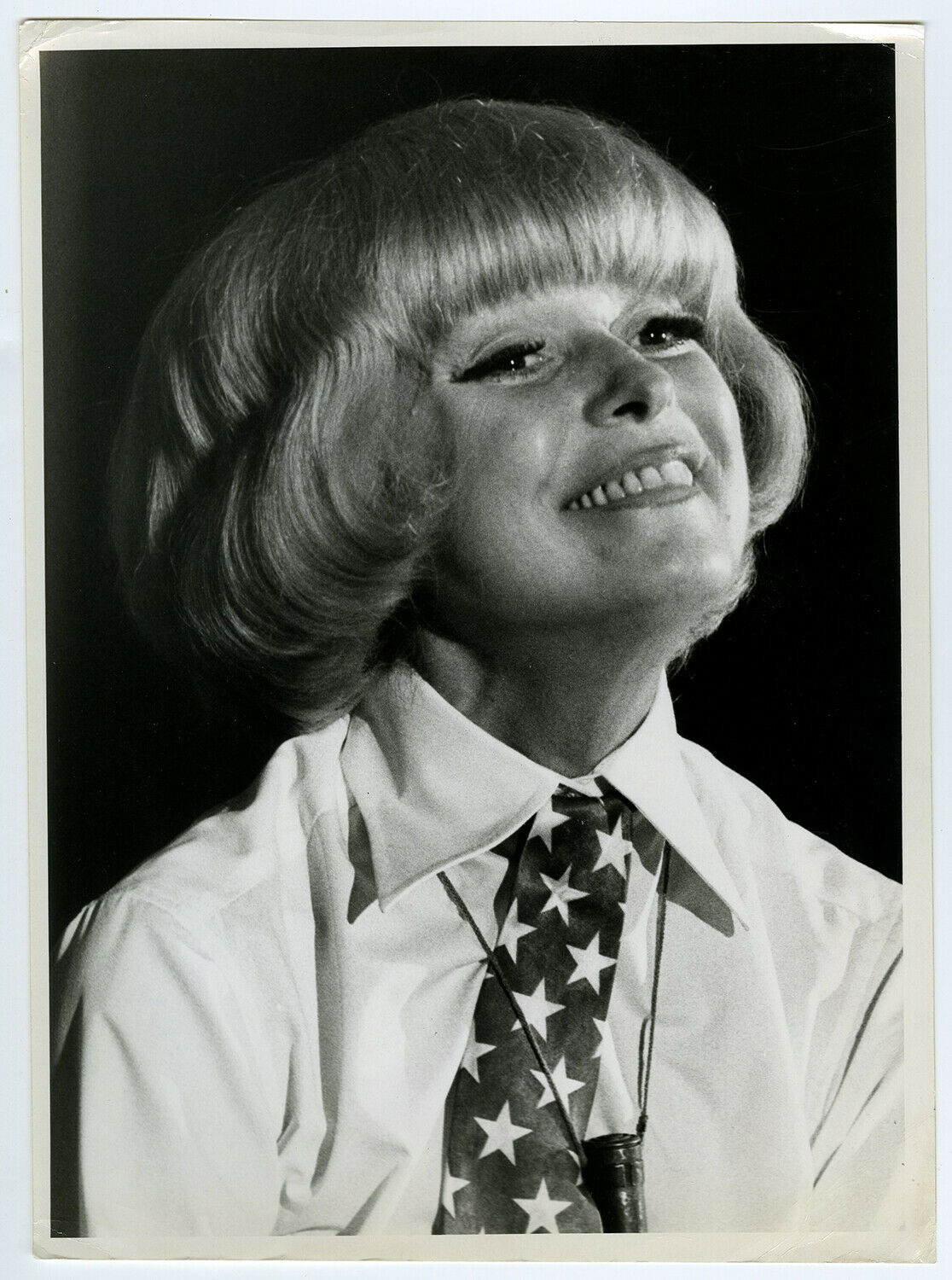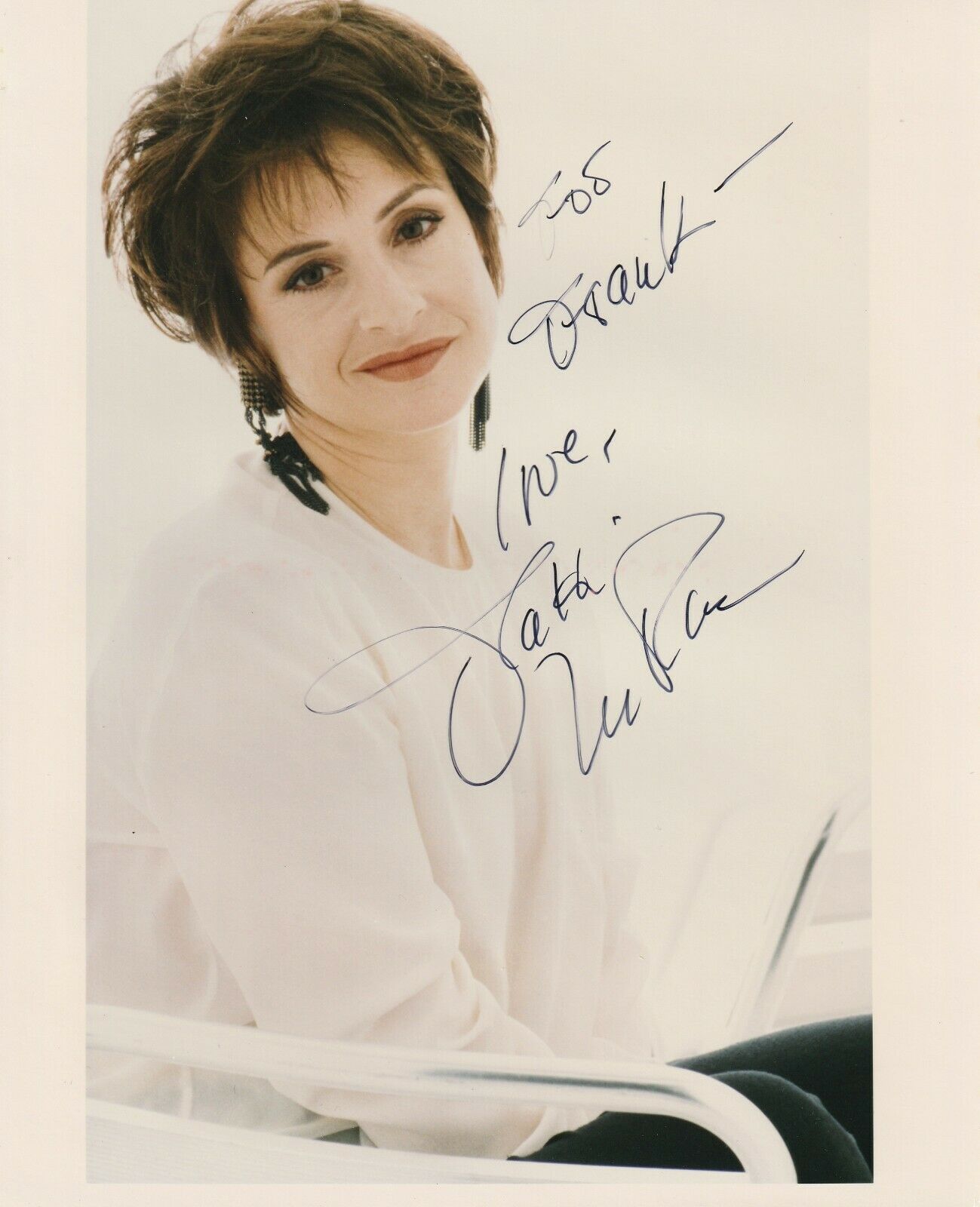-40%
The First Lady of Musical Comedy Carol Channing Original c. 1973 Photograph
$ 2.61
- Description
- Size Guide
Description
ITEM: This is a c. 1973 vintage and original photograph of actress, singer, dancer and comedienne Carol Channing. Known as the First Lady of Musical Comedy, Carol is pictured here with her trademark inflated blonde hair cut into a short bob with blunt bangs and a bright smile. She wears a white collared shirt and a star patterned neck tie while on stage.Known for starring in Broadway and film musicals, Carol's characters usually had a fervent expressiveness and an easily identifiable voice, whether singing or for comedic effect. Some of her best known stage productions include "Gentlemen Prefer Blondes" (1949), "Hello, Dolly!" (1964), "The Vamp" (1955), and "Show Girl" (1961).
Photograph measures 8" x 11" on a glossy single weight paper stock with notations on verso.
Guaranteed to be 100% vintage and original from Grapefruit Moon Gallery.
More about Carol Channing:
Dubbed The First Lady of Musical Comedy, Carol Channing spent over five decades on the Broadway stage and was forever linked with signature leading roles in "Gentlemen Prefer Blondes" and "Hello, Dolly!" The flamboyant peroxide blonde with the fire engine red lipstick and ever-present smile earned multiple Tony Awards for her extended stage runs in those Broadway blockbusters, as well as recognition for musicals "Vamp," "Showgirl" and "Lorelei." But Channing became a recognized pop culture icon far from New York theater circles, bringing her larger-than-life personality to primetime as the star of variety specials and with her Oscar- and Golden Globe-nominated starring turn in the musical film "Thoroughly Modern Millie" (1967). With the exception of that stroke of pitch perfect casting and a brilliant performance, Channing's talent generally did not translate successfully to the big screen. No matter, as audiences were most captivated by the "Channing" persona, which they were able to enjoy with her many appearances on cheeky celebrity panel game shows, variety specials and awards shows. While Channing's highly recognizable voice was a favorite of impressionists, and female impersonators latched onto her thick-lashed caricature of a Broadway diva, the singer, dancer, and comedienne performed throughout her eighties, continually criss-crossing the country in musical comedy revues, one-woman shows, and endless revivals of her best loved characters, Dolly and Lorelei. After Carol Channing died on January 15, 2019 at the age of 97, the lights on Broadway were dimmed in her honor, a rare tribute to one of the American theater's most iconic performers.
Carol Channing was born in Seattle, WA, on Jan. 31, 1921, but was raised in San Francisco where her father was a newspaper editor and high profile Christian Science lecturer. It was only in her late teens that Channing was informed that her German-American father had actually been born in Georgia to an African-American mother - a fact Channing kept private until the publication of her memoir in 2003. But prior to learning her family history, Channing was raised as an only child who learned to entertain herself from an early age. She first discovered her talent for entertaining others when the seven-year-old unleashed impressions of her teachers on the students at school and earned rounds of laughter. She was hooked on the positive feedback and after taking the stage in high school, she went on to study dance and drama at Bennington College in Vermont. Later, in New York, she aligned herself with avant garde theater but found more success when she began to work alongside Zero Mostel in a Greenwich Village club, doing imitations of early stage and screen stars like Beatrice Lillie, Sophie Tucker and Tallulah Bankhead.
After some time working on the resort circuit and New York theater chorus and understudy gigs, Channing got her first break when she was cast by Gower Champion in the 1948 Broadway revue "Lend An Ear," in which she wowed audiences by playing such diverse characters as a French movie star, a British Christian Scientist, and 1920s flapper. The following year, she hit Broadway in a starring role as Lorelei Lee, the "Little Girl from Little Rock" for whom diamonds are a girl's best friends in the musical "Gentlemen Prefer Blondes." The successful musical ran for nearly two years and transformed Channing into a bona fide Broadway star whose reputation spread far beyond the Great White Way. She went on to make her film debut in the Hal Wallis-produced melodrama "Paid in Full" (1949), but when she was not inundated with follow-up film offers, she revived her role of Lorelei in a Chicago run of "Gentlemen," toured the U.S. in "Pygmalion," and returned to Broadway in "Wonderful Town" and "Vamp."
In 1955, Channing portrayed a beautiful artist's model transformed into a great singer by a hypnotic genius (Basil Rathbone) in the amusing TV musical special, "Svengali and the Blonde" (NBC). She hit movie theaters the following year in a role as the slightly mature love interest to Clint Eastwood in the oddball Western "The First Traveling Saleslady" (1956). An indefatigable stage performer, Channing also toured nightclubs across the U.S. in between theater engagements, often appearing alongside comic duo Burns & Allen. Channing graced the Broadway stage again in late 1963, brilliantly cast in the lead as brassy busybody and matchmaker Dolly Gallagher in "Hello, Dolly!" The blockbuster production garnered 10 Tony Awards including one for its star, who gave commanding performances for over three years. The original cast album became an all-time bestseller in its field; even bumping the Beatles off the music charts when it was released. Channing, herself chatty, effervescent, and rarely seen without an ear-to-ear grin, had established herself as a show business institution, so it was only natural that she would become a mainstay on personality-based game shows like "What's My Line" (CBS, syndicated, 1950-1975), "To Tell the Truth" (CBS, 1956-1968; syndicated 1969-1978) and make recurring appearances on the comedy/variety show, "Rowan and Martin's Laugh-In" (NBC, 1968-1973).
The Broadway star returned to the big screen with her role as a 1920s "jazz baby" in the musical "Thoroughly Modern Millie" (1967), inarguably the best screen role to utilize the actress' charisma and talents. For her captivating performance, Channing won a Golden Globe Award and earned an Oscar nomination as Best Supporting Actress. During the same period, she found a great reception for a series of television specials, including "An Evening with Carol Channing" (CBS, 1966), "Carol Channing and 101 Men" (ABC, 1967) and "Carol Channing Proudly Presents the Seven Deadly Sins" (ABC, 1969), all of which featured musical performances by Channing and music and comedy from high profile showbiz guests. Appropriate screen roles remained at bay, though she did appear as Jackie Gleason's bohemian wife in a quirky Otto Preminger comedy "Skidoo" (1968). She starred again on Broadway in the 1970 comedy "Four on a Garden" and in 1971, discovered another excellent outlet as a voiceover actress in animated films when she landed a role in "Shinbone Alley" (1971). After earning another Tony nomination for reviving her famous character in the spin-off musical "Lorelei," Channing toured the U.S. with "Gentlemen Prefer Blondes" in 1975.
With the exception of a recurring guest character role on "The Love Boat" (ABC, 1977-1986), Channing stuck to the stage, reprising her role in "Hello Dolly!" in Los Angeles in 1977 and on Broadway again in 1978 before taking that production on the road in 1981. She and fellow Broadway leading lady Mary Martin played rival actresses in a touring musical production called "Legends," while Channing played The White Queen in an all-star version of "Alice in Wonderland" (CBS, 1985) on CBS. While continuing to perform regularly in nightclub acts in Las Vegas and throughout the U.S., Channing also recorded more than 20 children's albums, ramping up her voiceover career with roles in "Where's Waldo?" (1991), "Hans Christian Andersen's 'Thumbelina'" (1994), and the PBS series "The Magic School Bus" (1994-99). In 1994, Channing once again donned the familiar red dress and returned to the Harmonia Gardens for a 30th anniversary production of "Hello, Dolly!" The following year, she received a special Lifetime Achievement Tony Award and embarked on a 51-city concert tour of the U.S., resurfacing on primetime with rare guest appearances (as herself) on "The Drew Carey Show" (ABC, 1995-2004) and "Touched by an Angel" (CBS, 1994-2003).
In 2003, Channing released the memoir Just Lucky, I Guess and launched a national touring one-woman show entitled "The First Eighty Years are the Hardest." Well into her eighties, she continued to appear in stage revues that mixed song, dance and plenty of old show biz anecdotes while maintaining a screen presence with voiceover roles on animated series including "Family Guy" (Fox, 1999-2002; 2005- ) and "American Dad!" (Fox, 2005- ). In 2011, Channing was the subject of the documentary "Carol Channing: Larger Than Life" (2011). Her final TV appearance came in an episode of reality competition "RuPaul's Drag Race" (Logo/VH1 2009- ). Carol Channing died at her home in Racho Mirage, California on January 15, 2019. She was 97.
Biography From TCM | Turner Classic Movies











